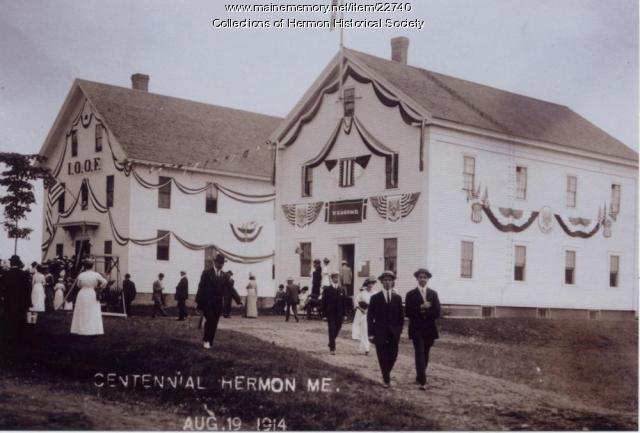Category: Agriculture
Item 14336
Mary Drake Seeley, Houlton, ca. 1890
Contributed by: Aroostook County Historical and Art Museum Date: circa 1890 Location: Houlton Media: Photographic print
Item 25598
Strout Greenhouses, Biddeford, 1909
Contributed by: McArthur Public Library Date: 1909 Location: Biddeford Media: Photographic print
Item 148733
Plan of Seboomook Farm, Seboomook, 1923
Contributed by: Maine Historical Society Date: 1923 Location: Seboomook Client: Great Northern Paper Company Architect: Great Northern Paper Company
Item 148198
Opportunity Farm cow barn end framing, New Gloucester, ca. 1945
Contributed by: Maine Historical Society Date: circa 1945 Location: New Gloucester Client: Opportunity Farm Association Architect: University of Maine Cooperative Extension Work in Agriculture
Exhibit
Blueberries to Potatoes: Farming in Maine
Not part of the American "farm belt," Maine nonetheless has been known over the years for a few agricultural items, especially blueberries, sweet corn, potatoes, apples, chickens and dairy products.
Exhibit
Maine Eats: the food revolution starts here
From Maine's iconic lobsters, blueberries, potatoes, apples, and maple syrup, to local favorites like poutine, baked beans, red hot dogs, Italian sandwiches, and Whoopie Pies, Maine's identity and economy are inextricably linked to food. Sourcing food, preparing food, and eating food are all part of the heartbeat of Maine's culture and economy. Now, a food revolution is taking us back to our roots in Maine: to the traditional sources, preparation, and pleasures of eating food that have sustained Mainers for millennia.
Site Page
View collections, facts, and contact information for this Contributing Partner.
Site Page
View collections, facts, and contact information for this Contributing Partner.
Story
Aroostook Potato Harvest: Perspective of a Six Year Old
by Phyllis A. Blackstone
A child's memory of potato harvest in the 1950s
Story
Growing up on a potato and dairy farm
by Paula Woodworth
Life growing up and working on a potato and dairy farm was hard work but fun in Aroostook County.
Lesson Plan
Building Community/Community Buildings
Grade Level: 6-8
Content Area: Social Studies
Where do people gather? What defines a community? What buildings allow people to congregate to celebrate, learn, debate, vote, and take part in all manner of community activities? Students will evaluate images and primary documents from throughout Maine’s history, and look at some of Maine’s earliest gathering spaces and organizations, and how many communities established themselves around certain types of buildings. Students will make connections between the community buildings of the past and the ways we express identity and create communities today.
Lesson Plan
Teddy Roosevelt, Millie, and the Elegant Ride Companion Curriculum
Grade Level: 3-5, 6-8
Content Area: Social Studies
These lesson plans were developed by Maine Historical Society for the Seashore Trolley Museum as a companion curriculum for the historical fiction YA novel "Teddy Roosevelt, Millie, and the Elegant Ride" by Jean. M. Flahive (2019). The novel tells the story of Millie Thayer, a young girl who dreams of leaving the family farm, working in the city, and fighting for women's suffrage. Millie's life begins to change when a "flying carpet" shows up in the form of an electric trolley that cuts across her farm and when a fortune-teller predicts that Millie's path will cross that of someone famous. Suddenly, Millie finds herself caught up in events that shake the nation, Maine, and her family. The lesson plans in this companion curriculum explore a variety of topics including the history of the trolley use in early 20th century Maine, farm and rural life at the turn of the century, the story of Theodore Roosevelt and his relationship with Maine, WWI, and the flu pandemic of 1918-1920.


















